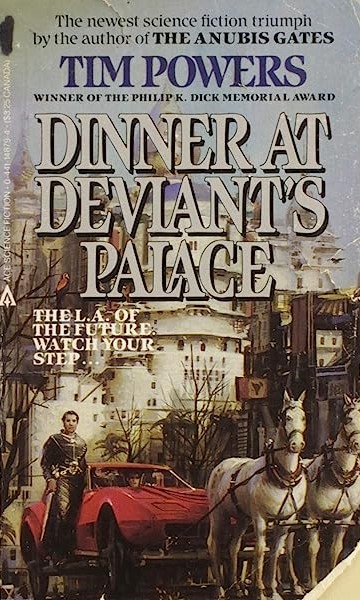A post-apocalyptic fantasy with a difference. That “difference” is, simply, that it was written by Tim Powers, who never did anything the cut-and-dried way. His LA set wasteland, published after his time travel themed masterpiece THE ANUBIS GATES, is distinguished by a funhouse ambiance, yet it contains just enough realistic detail to stay balanced on the razor’s edge of believability.
As is standard with Powers, he doesn’t make much attempt at seducing the reader into the narrative. Powers’ concerns are with the strength and validity of his fictional universe, which is, as always, damned impressive in its imaginative breadth—enough so that merely keeping track of all the characters, and the laws governing the world in which they live, is something of a challenge. That challenge, however, offers a generous reward for those willing to make the effort.
In this world people traverse the ruins of Los Angeles via horse drawn cars. A type of medieval feudalism has overtaken the surviving populace, which is divided into warring religious factions. One of the most prominent of those factions is a cult run by Norton Jaybush, a charismatic individual endowed with what appear to be magic powers. He is indeed in possession of some impressive abilities, although, as we learn, they’re not truly magic in nature.
There’s also Greg Rivas, a tough guy enforcer who now devotes his time to music. But of course, he’s contracted by an individual who wants Rivas to perform a “Redemption,” i.e. to rescue from Jaybird’s clutches a young woman, Urania, who just happens to be an ex-girlfriend of Rivas. To this he can’t say no.
Rivas’ ensuing odyssey brings him into contact with a colorful assortment of mutants, monsters and desperate people, and an equally colorful retinue of settings. Foremost among the latter is Deviant’s Palace, a debauched nightclub located in Venice Beach that has a reputation for some dastardly goings-on. Rivas, you can be sure, eventually makes way to this “palace,” and learns both the truth about Jaybird’s powers (hint: they’re not of this world) and precisely what’s going on with Urania.
I can make a few complaints about this book. The Deviant’s Palace set passages could have stood to be far more baroque and perverse than they are given the excessive build-up Powers provides (with Rivas spending a great deal of time dreading what he’ll find therein); likewise the climactic reappearance of Urania, which given her outsized presence in Rivas’ psyche (in the form of many a haunted memory) feels disappointingly matter-of-fact.
Yet for the most part DINNER AT DEVIANT’S PALACE represents top-flight Powers. His madcap invention and wholehearted embrace of the bizarre are worthy of his mentor Philip K. Dick (with this novel bearing a more-than-passing resemblance to DEUS IRAE, co-authored by the great man), and are paired with storytelling that mixes airy fantasy with the harsh realities of life and death, as in a subplot involving a young boy Rivas attempts to save (“attempts” being the operative word). Also, at under 300 pages this qualifies as one of the shorter Powers novels on record, yet it still contains every bit of the thematic heft of just about any of his 400-plus page epics.

